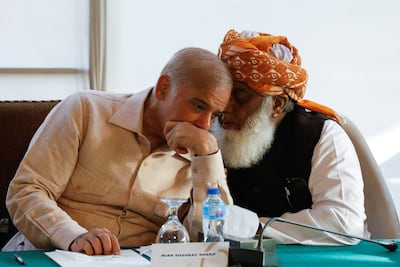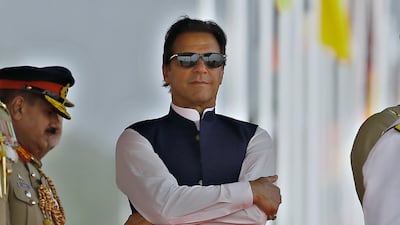Pakistani Prime Minister Imran Khan said in a televised address to the nation on Thursday that he would not resign before a vote to oust him is held on Sunday.
Mr Khan also said a “western country” is backing his removal because he visited Russia to meet President Vladimir Putin last month.
No Pakistani prime minister has ever seen out a full term and Mr Khan is facing the biggest challenge to his rule since being elected in 2018. His opponents accuse him of economic mismanagement and foreign policy bungling.
The government is also battling to contain a rise in militancy by the Pakistani Taliban, which on Wednesday announced an offensive against security forces during Ramadan, which is due to begin with the sighting of the next new moon.
Debate on the no-confidence motion was due to start on Thursday, but the deputy speaker suspended proceedings when members of Parliament declined to first address other items on the agenda.
“I and the whole nation demand an immediate voting on the motion of no confidence,” said Marriyum Aurangzeb, a senior opposition leader, to chants of “vote".
“It seems that no one is interested in the question-answer session, therefore the session is suspended,” said deputy speaker Qasim Khan Suri, from Mr Khan's ruling Pakistan Tehreek-e-Insaf (PTI) party.
Shehbaz Sharif, tipped to become the next prime minister if Mr Khan is ousted, condemned the suspension.
“The deputy speaker has once again dishonoured the parliamentary norms by not allowing the agenda item for a debate,” he told reporters outside the Parliament building.
The PTI effectively lost its majority in the 342-member National Assembly on Wednesday when a coalition partner said its seven members would vote with an opposition alliance.
More than a dozen PTI politicians have also indicated they will cross the floor, although party leaders are trying to get the courts to prevent them from voting.
In the past, parties have resorted to physically preventing MPs from voting against key legislation by blocking access to the National Assembly, leading to cat-and-mouse chases and even accusations of kidnapping.
The opposition is headed by the Pakistan Muslim League-N (PML-N) and the Pakistan People's Party (PPP) — two usually feuding dynastic groups that dominated national politics for decades until *Mr Khan forged a coalition against them.
He was elected after promising to sweep away decades of entrenched corruption and cronyism, but has struggled to maintain support with inflation skyrocketing, a feeble rupee and crippling debt.
In recent days, Mr Khan has turned to conspiracy theories to explain the challenge to his rule and has gone on national television to claim the opposition is in cahoots with a foreign government — a reference to the US — to unseat him.
Mr Khan’s often-stated opposition to Washington’s so-called war in terror as well as the US-led invasion of Afghanistan has brought him popularity at home.
He has tried to reach out to Afghanistan’s new Taliban rulers, fostered close ties to China and Russia and abstained from the UN Security Council vote condemning Russian for invading Ukraine.
Madiha Afzal, a fellow at the Washington-based Brookings Institution, blamed Mr Khan’s political woes on his confrontational style and a cooling of relations between him and the powerful military, widely reported to have assisted Mr Khan’s election victory in 2018.
Pakistan’s army has been the country’s de facto ruler more than half of its 75-year history — even when governments are democratically elected, the military maintains considerable control from behind the scenes, despite their claims of neutrality.
In a Brookings Institution podcast, Ms Afzal said it’s rare for a Pakistani political leader to finish his term.
“This is part of a much larger, longer cycle that reflects on Pakistan’s built-in political instability,” she said.
“Essentially, opposition parties don’t wait for elections to occur, for the previous party to be voted out, or for the prime ministers to be ousted from power.
“While the military says that it is neutral in this situation, in this political crisis, what many read that as saying is that the military has basically withdrawn its support from Khan.”
TCL INFO
Teams:
Punjabi Legends Owners: Inzamam-ul-Haq and Intizar-ul-Haq; Key player: Misbah-ul-Haq
Pakhtoons Owners: Habib Khan and Tajuddin Khan; Key player: Shahid Afridi
Maratha Arabians Owners: Sohail Khan, Ali Tumbi, Parvez Khan; Key player: Virender Sehwag
Bangla Tigers Owners: Shirajuddin Alam, Yasin Choudhary, Neelesh Bhatnager, Anis and Rizwan Sajan; Key player: TBC
Colombo Lions Owners: Sri Lanka Cricket; Key player: TBC
Kerala Kings Owners: Hussain Adam Ali and Shafi Ul Mulk; Key player: Eoin Morgan
Venue Sharjah Cricket Stadium
Format 10 overs per side, matches last for 90 minutes
When December 14-17
Our legal advisor
Ahmad El Sayed is Senior Associate at Charles Russell Speechlys, a law firm headquartered in London with offices in the UK, Europe, the Middle East and Hong Kong.
Experience: Commercial litigator who has assisted clients with overseas judgments before UAE courts. His specialties are cases related to banking, real estate, shareholder disputes, company liquidations and criminal matters as well as employment related litigation.
Education: Sagesse University, Beirut, Lebanon, in 2005.
All%20The%20Light%20We%20Cannot%20See%20
%3Cp%3E%3Cstrong%3ECreator%3A%20%3C%2Fstrong%3ESteven%20Knight%3C%2Fp%3E%0A%3Cp%3E%3Cstrong%3EStars%3A%C2%A0%3C%2Fstrong%3EMark%20Ruffalo%2C%20Hugh%20Laurie%2C%20Aria%20Mia%20Loberti%3C%2Fp%3E%0A%3Cp%3E%3Cstrong%3ERating%3A%20%3C%2Fstrong%3E1%2F5%C2%A0%3C%2Fp%3E%0A
Match info
Manchester United 1 (Van de Beek 80') Crystal Palace 3 (Townsend 7', Zaha pen 74' & 85')
Man of the match Wilfried Zaha (Crystal Palace)
SPEC%20SHEET%3A%20SAMSUNG%20GALAXY%20S24%20ULTRA
%3Cp%3E%3Cstrong%3EDisplay%3A%3C%2Fstrong%3E%206.8%22%20quad-HD%2B%20dynamic%20Amoled%202X%2C%203120%20x%201440%2C%20505ppi%2C%20HDR10%2B%2C%20120Hz%3C%2Fp%3E%0A%3Cp%3E%3Cstrong%3EProcessor%3A%3C%2Fstrong%3E%204nm%20Qualcomm%20Snapdragon%208%20Gen%203%2C%2064-bit%20octa-core%3C%2Fp%3E%0A%3Cp%3E%3Cstrong%3EMemory%3A%3C%2Fstrong%3E%2012GB%20RAM%3C%2Fp%3E%0A%3Cp%3E%3Cstrong%3EStorage%3A%3C%2Fstrong%3E%20256%2F512GB%20%2F%201TB%3C%2Fp%3E%0A%3Cp%3E%3Cstrong%3EPlatform%3A%3C%2Fstrong%3E%20Android%2014%2C%20One%20UI%206.1%3C%2Fp%3E%0A%3Cp%3E%3Cstrong%3EMain%20camera%3A%3C%2Fstrong%3E%20quad%20200MP%20wide%20f%2F1.7%20%2B%2050MP%20periscope%20telephoto%20f%2F3.4%20with%205x%20optical%2F10x%20optical%20quality%20zoom%20%2B%2010MP%20telephoto%202.4%20with%203x%20optical%20zoom%20%2B%2012MP%20ultra-wide%20f%2F2.2%3B%20100x%20Space%20Zoom%3B%20auto%20HDR%2C%20expert%20RAW%3C%2Fp%3E%0A%3Cp%3E%3Cstrong%3EVideo%3A%3C%2Fstrong%3E%208K%4024%2F30fps%2C%204K%4030%2F60%2F120fps%2C%20full-HD%4030%2F60%2F240fps%2C%20full-HD%20super%20slo-mo%40960fps%3C%2Fp%3E%0A%3Cp%3E%3Cstrong%3EFront%20camera%3A%3C%2Fstrong%3E%2012MP%20f%2F2.2%3C%2Fp%3E%0A%3Cp%3E%3Cstrong%3EBattery%3A%3C%2Fstrong%3E%205000mAh%2C%20fast%20wireless%20charging%202.0%2C%20Wireless%20PowerShare%3C%2Fp%3E%0A%3Cp%3E%3Cstrong%3EConnectivity%3A%3C%2Fstrong%3E%205G%2C%20Wi-Fi%2C%20Bluetooth%205.3%2C%20NFC%3C%2Fp%3E%0A%3Cp%3E%3Cstrong%3EI%2FO%3A%3C%2Fstrong%3E%20USB-C%3B%20built-in%20Galaxy%20S%20Pen%3C%2Fp%3E%0A%3Cp%3E%3Cstrong%3EDurability%3A%3C%2Fstrong%3E%20IP68%2C%20up%20to%201.5m%20of%20freshwater%20up%20to%2030%20minutes%3B%20dust-resistant%26nbsp%3B%3C%2Fp%3E%0A%3Cp%3E%3Cstrong%3ESIM%3A%3C%2Fstrong%3E%20Nano%20%2B%20nano%20%2F%20nano%20%2B%20eSIM%20%2F%20dual%20eSIM%20(varies%20in%20different%20markets)%3C%2Fp%3E%0A%3Cp%3E%3Cstrong%3EColours%3A%3C%2Fstrong%3E%20Titanium%20black%2C%20titanium%20grey%2C%20titanium%20violet%2C%20titanium%20yellow%3C%2Fp%3E%0A%3Cp%3E%3Cstrong%3EIn%20the%20box%3A%20%3C%2Fstrong%3EGalaxy%20S24%20Ultra%2C%20USB-C-to-C%20cable%26nbsp%3B%3C%2Fp%3E%0A%3Cp%3E%3Cstrong%3EPrice%3A%3C%2Fstrong%3E%20Dh5%2C099%20for%20256GB%2C%20Dh5%2C599%20for%20512GB%2C%20Dh6%2C599%20for%201TB%3C%2Fp%3E%0A
Disposing of non-recycleable masks
Use your ‘black bag’ bin at home
Do not put them in a recycling bin
Take them home with you if there is no litter bin
- No need to bag the mask
Types of bank fraud
1) Phishing
Fraudsters send an unsolicited email that appears to be from a financial institution or online retailer. The hoax email requests that you provide sensitive information, often by clicking on to a link leading to a fake website.
2) Smishing
The SMS equivalent of phishing. Fraudsters falsify the telephone number through “text spoofing,” so that it appears to be a genuine text from the bank.
3) Vishing
The telephone equivalent of phishing and smishing. Fraudsters may pose as bank staff, police or government officials. They may persuade the consumer to transfer money or divulge personal information.
4) SIM swap
Fraudsters duplicate the SIM of your mobile number without your knowledge or authorisation, allowing them to conduct financial transactions with your bank.
5) Identity theft
Someone illegally obtains your confidential information, through various ways, such as theft of your wallet, bank and utility bill statements, computer intrusion and social networks.
6) Prize scams
Fraudsters claiming to be authorised representatives from well-known organisations (such as Etisalat, du, Dubai Shopping Festival, Expo2020, Lulu Hypermarket etc) contact victims to tell them they have won a cash prize and request them to share confidential banking details to transfer the prize money.

















